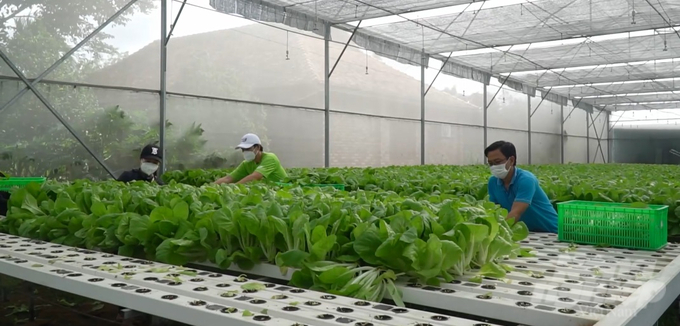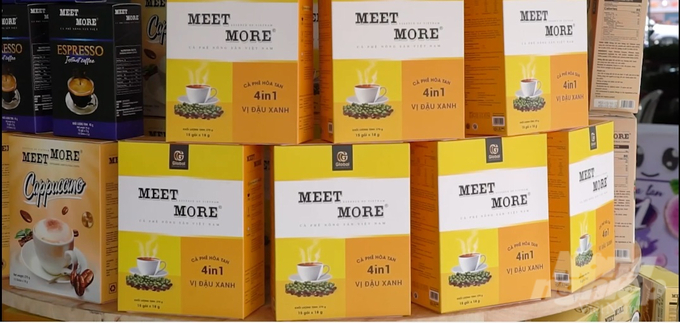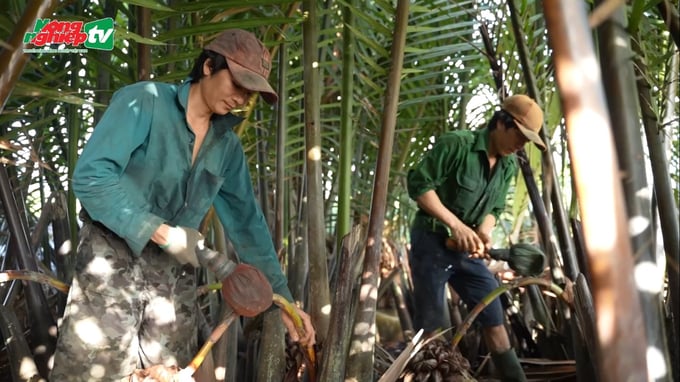May 24, 2025 | 16:19 GMT +7
May 24, 2025 | 16:19 GMT +7
Hotline: 0913.378.918
May 24, 2025 | 16:19 GMT +7
Hotline: 0913.378.918

As a large city, with the main economic structure being industry and services, Ho Chi Minh City still focuses on developing agriculture. Photo: VAN.
As a large city, with the main economic structure being industry and services, Ho Chi Minh City still focuses on developing agriculture and rural areas as well as rural products that are typical of the city.
Therefore, right after the Vietnamese Government approved the One Commune One Product (OCOP) Program in 2018, in early 2019, the Ho Chi Minh City People's Committee also approved the One Commune One Product Program in the rural areas of the city.
After 5 years of implementation, as of now, there have been 255 products of 87 entities in Ho Chi Minh City certified as OCOP products, including 79 products meeting 4-star standards and 176 products meeting 3-star standards.
Ho Chi Minh City's OCOP products are currently quite rich and diverse. Among them, there are products that demonstrate uniqueness and creativity in ideas, such as agricultural coffee products of Meet More Coffee Global Trading Connection Co., Ltd. (Meet More Coffee).

Meet More's agricultural coffee is one of Ho Chi Minh City's OCOP products. Photo: VAN.
Sharing with Vietnam Agriculture Newspaper about the formation history of agricultural coffee, Mr. Nguyen Ngoc Luan, CEO of Meet More Coffee, said that the business's story of bringing agricultural products into coffee started in 2018, when he had the opportunity to take many foreign businesses to purchase Vietnamese agricultural products. In that process, a South Korean business gave him the idea of processing products from Vietnamese agricultural products instead of only selling raw agricultural products. Because of that, I started researching and launching agricultural coffee.
According to Mr. Nguyen Ngoc Luan, Vietnam is blessed with many good agricultural products that other countries do not have and have to import from other countries to process. And coffee is also one of Vietnam's agricultural products, with a large position in the world. When referring to Vietnamese coffee, everyone thinks that Vietnamese coffee is taking the No. 1 or No. 2 position in exports. However, Vietnamese coffee has not yet created the value on the world coffee map.
From that viewpoint, the CEO of Meet More Coffee thinks that combining coffee with Vietnamese agricultural products, including Vietnamese fruits and vegetables, will both create value for coffee and create new value for Vietnamese agricultural products. And from there, Meet More with agricultural coffee was born.
"In particular, Meet More's agricultural coffee was born to suit the consumer trend in the world. Previously, we often sold what the market needed, not what we had. But at this time, in the flat economy and the global economy, we must create demand for the market.
Meanwhile, it is seen that 200 countries around the world drink a very light and mild type of coffee with just enough caffeine to suit a person's body. Whereas Vietnamese coffee has its own taste, which is bitter, strong, and thick, so we cannot build a brand in the world. We consider our coffee delicious, but the world does not consider it delicious. Therefore, Meet More's agricultural coffee line aims to suit all ages of consumers around the world," added Mr. Nguyen Ngoc Luan.

Mr. Nguyen Ngoc Luan (middle), CEO of Meet More Coffee, and Mr. Phan Minh Tien (right), CEO of Vietnam Nipa Corporation, participated in Vietnam Agriculture Newspaper's Talk Show. Photo: VAN.
In addition to products with unique characteristics to attract the attention of customers, Ho Chi Minh City also has products with unique ways of thinking and doing that contribute to raising the value of Vietnamese agricultural products, such as Nipa palm honey from Vietnipa, pennywort powder and perilla powder from Viet Nature, etc.
As a son of Can Gio district, Mr. Phan Minh Tien, CEO of Vietnam Nipa Corporation (Vietnipa), always wondered how to increase the value of Nipa palm trees, a great resource of Can Gio district in particular and the South in general.
According to Mr. Phan Minh Tien, Can Gio district alone has a large area of Nipa palm, up to 900 hectares. Especially, the area in the south is 10 times more. However, in the past, people only used Nipa palm leaves for roofing or the fruit to eat Nipa palm meat, so the value was not high. Even people now use new materials for roofing and rarely use coconut leaves, so the destruction or reduction of Nipa palm areas is increasing.
In addition, climate change is increasingly serious, greatly affecting people's livelihoods, work, and income. At the same time, an issue emerged about food safety and hygiene and organic products, especially the issue of sugar. Sugar is a food used regularly and directly affecting health, so the trend of using organic sugar is increasing.
Therefore, the CEO of Vietnipa started researching through many documents and realized that if having technique, after the coconut bunch is chopped, the coconut stem sprouting will secrete drops of honey. With 1 hectare of Nipa palm, it is possible to harvest 20 tons of Nipa palm sugar/year, equivalent to cane sugar.

Can Gio district alone has a large area of Nipa palm, up to 900 hectares. Photo: VAN.
Realizing that great potential, Vietnipa promoted Nipa palm farming to harvest organic products from Nipa palm, specifically Nipa palm honey and Nipa palm sugar. These products both meet the consumer trend and enhance the value of Nipa palm trees, thereby contributing to creating more income for people and protecting the environment.
It can be seen that the difference and uniqueness in products or ways of thinking and doing have brought success for businesses, typically Meet More Coffee and Vietnipa, and helped OCOP products in Ho Chi Minh City in particular and Vietnam in general conquer domestic and foreign consumers.
Translated by Thu Huyen

(VAN) The People's Committee of Tra Vinh province has approved an adjustment to the investment policy for the Green Hydrogen Plant project, increasing its area to approximately 52.76 hectares.
![Reducing emissions from rice fields: [2] Farmers’ commitment to the soil](https://t.ex-cdn.com/nongnghiepmoitruong.vn/608w/files/news/2025/05/05/dsc08881jpg-nongnghiep-140632.jpg)
(VAN) Clean rice cultivation model in Thuong Tan commune, Bac Tan Uyen district, is assisting local residents in achieving sustainable agriculture by substantially reducing costs, increasing productivity, and protecting the environment.

(VAN) At the conference to disseminate Resolution No. 68, AgriS introduced its digital agricultural ecosystem and reaffirmed its commitment to accompanying the Government in promoting private sector development and sustainable agriculture.

(VAN) 'Blue Ocean - Blue Foods' initiative is designed to restore marine ecosystems and establish sustainable livelihoods for local communities by cultivating a minimum of 1,000 hectares of cottonii seaweed in the first three years.
/2025/05/21/4642-3-112707_603.jpg)
(VAN) The V-SCOPE project has made direct contributions to three out of six pillars of the Comprehensive Strategic Partnership between Vietnam and Australia.

(VAN) Facing the threat of rabies spreading to the community, Gia Lai province urgently carries out measures to vaccinate dogs and cats on a large scale.

(VAN) Disease-free livestock farming not only protects livestock herds but also stabilizes production and livelihoods for many farmers in Tuyen Quang.